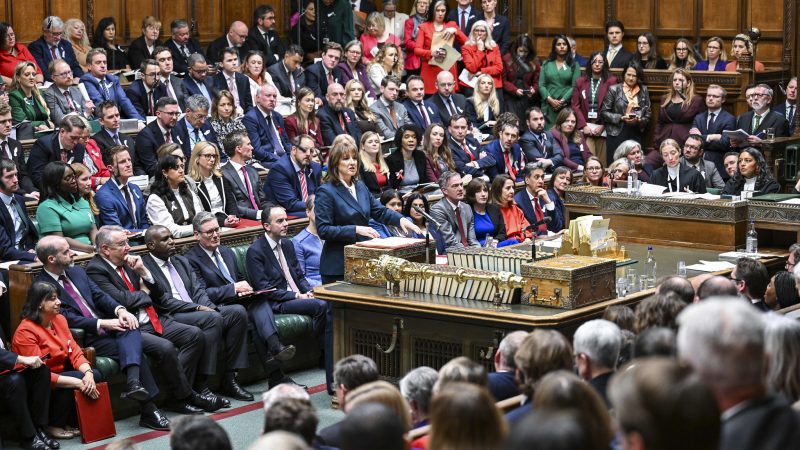
What a week.
The Budget brought no shortage of announcements to talk about, including some truly Labour decisions from the Chancellor.
Here are the seven most exciting breakthroughs and announcements this week – from the Treasury and beyond – that you can use, whether you’re on the doorstep, sparring on Twitter, or debating in the pub.
1. Scrapping the two child benefit cap
Labour is ending the two-child limit on benefits, which is expected to lift 450,000 children out of poverty by the end of the decade.
The cap, introduced by the Conservatives eight years ago, meant families couldn’t claim extra universal credit for third or subsequent children born after April 2017. Affected families were losing around £3,500 per year per child.
The move will cost £3.5 billion a year, but keeping children in poverty costs the country £40 billion through unemployment, lower earnings, and higher public service costs, according to the Women’s Budget Group.
Subscribe here to our daily newsletter roundup of Labour news, analysis and comment– and follow us on Bluesky, WhatsApp, X and Facebook.
2. Pay rise for low-paid workers
The minimum wage will rise by 4.1% to £12.71 an hour from April, giving 2.4 million workers an extra £900 a year.
Young workers aged 18-20 will see an 8.5% increase to £10.85 an hour, narrowing the gap with older workers as Labour works toward equal pay for all adults.
The rise for 16-17 year-olds and apprentices will be 6% to £8 an hour.
3. Cutting energy bills by £150
Labour is saving households an average of £150 next year, by removing green levies from energy bills.
The government is ditching the energy company obligation scheme in April, saving £67 per household. It’s also temporarily removing part of the renewables obligation, saving another £78.
The changes will take average bills down to around £1,675 from April.
4. Freezing rail fares and prescriptions
Labour is freezing regulated rail fares in England for the first time in 30 years, saving commuters on expensive routes over £300. This includes season tickets and off-peak returns, which make up 45% of all fares.
NHS prescription charges will also stay frozen at £9.90, saving patients £12 million next year. The freeze ensures no one avoids medication because of cost while the cost of living remains high.
5. Slashing NHS waiting times
Labour is building 250 new Neighbourhood Health Centres that will bring GPs, nurses, dentists and pharmacists together under one roof, starting in the most deprived areas.
Patients will get treatment minutes from home instead of travelling miles to hospitals. The centres will provide end-to-end care for people with complex conditions like diabetes and heart failure.
The government is also investing £300 million in NHS technology to automate admin tasks and give staff more time to care. Hospital productivity is already up 2.4% this year.
6. Protecting domestic abuse victims
More than 1,000 victims have been protected through new domestic abuse protection orders since they launched last November.
Unlike previous orders, these have no time limits – courts can keep restrictions in place for as long as needed to keep victims safe. Perpetrators can be tagged, banned from contact, or required to attend behaviour change programmes.
Breaching an order is punishable by up to five years in prison. The orders are now rolling out nationally after successful pilots.
7. £4 billion Indonesian defence deal
The government agreed a £4 billion maritime deal with Indonesia that will secure 1,000 British jobs in Rosyth, Bristol and Plymouth.
British firm Babcock will help Indonesia build vessels for their navy and fishing fleets. The boats will be built in Indonesia using British shipbuilding expertise, supporting jobs at home.
This follows a £10 billion contract with Norway for anti-submarine warfare destroyers supporting 4,000 UK jobs, and an £8 billion deal with Turkey for Typhoon fighter jets securing 20,000 jobs.
Share your thoughts. Contribute on this story or tell your own by writing to our Editor. The best letters every week will be published on the site. Find out how to get your letter published.
-
- SHARE: If you have anything to share that we should be looking into or publishing about this story – or any other topic involving Labour– contact us (strictly anonymously if you wish) at [email protected].
- SUBSCRIBE: Sign up to LabourList’s morning email here for the best briefing on everything Labour, every weekday morning.
- DONATE: If you value our work, please chip in a few pounds a week and become one of our supporters, helping sustain and expand our coverage.
- PARTNER: If you or your organisation might be interested in partnering with us on sponsored events or projects, email [email protected].
- ADVERTISE: If your organisation would like to advertise or run sponsored pieces on LabourList‘s daily newsletter or website, contact our exclusive ad partners Total Politics at [email protected].




More from LabourList
Letters to the Editor – week ending 22 February 2026
‘The coastal towns where young people have been left behind by Whitehall’
‘How Labour is modernising transport in Wales with fairness at its heart’